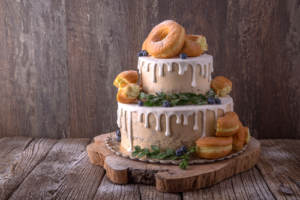The Great Wedding Cake Debate: The Pros and Cons of a Classic

How many times have you been to a wedding and seen half-eaten plates of cake lying around? Perhaps you’ve seen the sweet pièce de résistance, a saccharine frilly fondant-covered towering cake, and wondered if you should partake. Need help making up your mind in the great wedding cake debate? Here are a few things to consider as you choose your wedding-day confections.
The Case Against Cake
Those insisting that wedding cake is passé cite a few reasons for their position. Delish’s Kaitlin Menza presents her critiques, claiming that the average cake is stale, dry, lacking distinct flavor, and doesn’t leave a memorable impression on guests. Bon Appetit’s Rachel Tepper Paley argues that typical wedding cakes are often too expensive and sacrifice substance for style.
Part of the problem may lie its construction method. Bluprint contributor Jessie Oleson Moore explains that most are crafted from powdered sugar, corn syrup, and water, which turns into a clay-like substance that easily holds its shape. Its stiff consistency makes it ideal for sculpting elaborate details, but its excessive sweetness puts off a lot of people. Also, preparation for a single cake can begin several days or up to a week before the big day. With baking, cooling, storage, and decoration, that leaves plenty of opportunities for a cake to dry out.
Given that nearlyweds often worry whether their guests will even eat their cakes, these opinions have some merit. Thumbtack estimates that the median nationwide cost of wedding cakes falls between $350 and $450, while The Knot places it at $540 and Wedding Wire cites an average of $500 per cake. The cost per slice can also vary between $1.50 to $12, depending on the size of the cake and the region in which you’re getting married. Whether you’re planning to spend $5,000 or $35,000 on your nuptials, $500 is still a significant figure within your total event budget. If tiered cakes aren’t your thing and you can’t justify the expense, you have plenty of other options: cake pops, pies, donuts, tarts, tiramisu, crème brûlée, and many more.
Cake Lovers: Don’t Forget About Your Options
On the other hand, those who are pro-cake insist that not all of these desserts are bad. When made fresh with the right kind of icing and natural ingredients, wedding cake can be a delectable treat. The key, however, is a careful balance of aesthetics and flavor. As Jessie Oleson Moore points out, buttercream contains more fat than fondant. This results in a richer texture and taste, ideal for those who want great-tasting dessert. Cream cheese is another potential option, although care must be taken since it’s softer than buttercream. Cakes with softer icing can be decorated, but it’s best to choose natural or lightweight details. Some examples include food-safe flowers and greenery, fruit, nuts, ribbons, piped icing, and toppers that aren’t big and bulky.
Flavor choices can also affect the likelihood of your guests enjoying the cake. You may be weighing the benefits of traditional choices like chocolate or red velvet versus new favorites such as pumpkin spice or maple bacon. Loverly’s Kristin Doherty cautions against selecting too many flavors in one dish. You can get a lot of mileage out of two different cake flavors with a common filling and frosting. Those who can’t make up their minds should consider serving cupcakes or separate individual cakes at their dessert tables. If you’re worried about pricing, try serving a large sheet cake paired with a smaller and more elaborate version for cutting and feeding each other.
Focus on Preferences and Priorities
The great debate about wedding desserts continue, with both the cake and no-cake camps sounding off. Ultimately, weddings are both personalized affairs and community celebrations. As you mull this question, what matters most are your preferences, budget, and your guests’ enjoyment.














